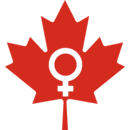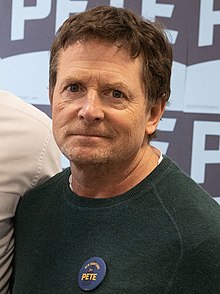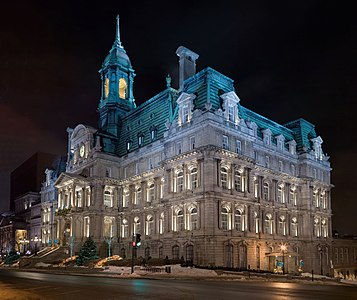| Showcase | Content | Contributing |
Introduction
Canada is a country in North America. Its ten provinces and three territories extend from the Atlantic Ocean to the Pacific Ocean and northward into the Arctic Ocean, making it the world's second-largest country by total area, with the world's longest coastline. Its border with the United States is the world's longest international land border. The country is characterized by a wide range of both meteorologic and geological regions. It is a sparsely inhabited country of just over 41 million people, the vast majority residing south of the 55th parallel in urban areas. Canada's capital is Ottawa and its three largest metropolitan areas are Toronto, Montreal, and Vancouver.
Canada is a parliamentary democracy and a constitutional monarchy in the Westminster tradition. The country's head of government is the prime minister, who holds office by virtue of their ability to command the confidence of the elected House of Commons and is appointed by the governor general, representing the monarch of Canada, the ceremonial head of state. The country is a Commonwealth realm and is officially bilingual (English and French) in the federal jurisdiction. It is very highly ranked in international measurements of government transparency, quality of life, economic competitiveness, innovation, education and gender equality. It is one of the world's most ethnically diverse and multicultural nations, the product of large-scale immigration. Canada's long and complex relationship with the United States has had a significant impact on its history, economy, and culture.
A developed country, Canada has a high nominal per capita income globally and its advanced economy ranks among the largest in the world, relying chiefly upon its abundant natural resources and well-developed international trade networks. Recognized as a middle power, Canada's strong support for multilateralism and internationalism has been closely related to its foreign relations policies of peacekeeping and aid for developing countries. Canada is part of multiple international organizations and forums. (Full article...)
Featured article -

The Calgary Stampede is an annual rodeo, exhibition, and festival held every July in Calgary, Alberta, Canada. The ten-day event, which bills itself as "The Greatest Outdoor Show on Earth", attracts over one million visitors per year and features one of the world's largest rodeos, a parade, midway, stage shows, concerts, agricultural competitions, chuckwagon racing, and First Nations exhibitions. In 2008, the Calgary Stampede was inducted into the ProRodeo Hall of Fame. (Full article...)
Featured biography -
Michael Andrew Fox OC (born June 9, 1961), known professionally as Michael J. Fox, is a Canadian and American activist and retired actor. Beginning his career as a child actor in the 1970s, he rose to prominence portraying Alex P. Keaton on the NBC sitcom Family Ties (1982–1989) and Marty McFly in the Back to the Future film trilogy (1985–1990). Fox went on to star in films such as Teen Wolf (1985), The Secret of My Success (1987), Casualties of War (1989), Doc Hollywood (1991), and The Frighteners (1996). He returned to television on the ABC sitcom Spin City in the lead role of Mike Flaherty (1996–2000). (Full article...)
Selected panorama -
National symbol -
The Royal Canadian Mounted Police (RCMP; French: Gendarmerie royale du Canada; GRC) is the national police service of Canada. The RCMP is an agency of the Government of Canada; it also provides police services under contract to 11 provinces and territories, over 150 municipalities, and 600 Indigenous communities. The RCMP is commonly known as the Mounties in English (and colloquially in French as la police montée). (Full article...)
Selected vital article -

The History of women in Canada is the study of the historical experiences of women living in Canada and the laws and legislation affecting Canadian women. In colonial period of Canadian history, Indigenous women's roles were often challenged by Christian missionaries, and their marriages to European fur traders often brought their communities into greater contact with the outside world. Throughout the colonial period, European women were encouraged to immigrate to Canadian colonies and expand the white population. After Confederation in 1867, women's experiences were shaped by federal laws and by legislation passed in Canada's provincial legislatures. (Full article...)
Selected picture -
Current events
- July 31, 2024 –
- One person is killed and at least 40 others are injured when a tent collapses in a windstorm at a Buddhist retreat in Busby, Alberta, Canada. (CBC News)
- July 28, 2024 – 2024 Summer Olympics
- Canada at the 2024 Summer Olympics
- Eleanor Harvey wins a bronze medal in fencing at the 2024 Olympics, making it the first medal Canada has ever won in fencing. (TSN)
- July 27, 2024 – 2024 Summer Olympics, Canada Soccer drone spying scandal
- In response to the spying incident involving the Canada women's national soccer team coaching staff using drones to spy on the New Zealand team, FIFA deducts six points from Canada in the Paris Olympics women's football tournament and bans three coaches for one year, including head coach Bev Priestman. (Al Jazeera)
- July 25, 2024 –
- The Canada Revenue Agency announces it will revoke the charity status of the Jewish National Fund, stating that the use of its donations to fund the IDF's military infrastructure violates Canadian tax laws. (National Post)
- July 24, 2024 – 2024 Canadian wildfires
- Two wildfires burning in Jasper National Park reach the Jasper townsite in Alberta, causing several structure fires, with over 25,000 residents evacuating their homes since Monday. (Edmonton Journal)
Did you know -

- ... that Annalee Newitz chose to set their debut novel Autonomous in the Canadian prairies because it was "the kind of place that often gets forgotten"?
- ... that Canadian photographer and architectural activist Brian Merrett's works prompted the preservation of Montreal's Shaughnessy House, now the Canadian Centre for Architecture?
- ... that the tourist attraction Little Canada has a "Littlization Station" used to create scale 3D replicas of visitors to be placed in the exhibit?
- ... that the Canadian rock band Rainbow Butt Monkeys changed their name to "Finger Eleven" before releasing their second album Tip?
- ... that Katherine Henderson led efforts to reverse the gender pay gap in Canadian curling?
- ... that the Bancroft region is the only place in Canada and one of very few places in the world where uranium has been mined from pegmatite rock?
- ... that Premier Maurice Duplessis, angry at the fact that the federal government of Canada was taking taxes at the expense of the provinces, once demanded that Ottawa "return our loot"?
Featured list -
Like most major cities, Montreal needs easy highway access from its suburbs and surrounding areas. However, because Montreal was built on an island surrounded by three rivers, it can be entered by land only on a bridge or through a tunnel. Although the city was founded in 1642, it was not until 1847 that the first fixed link to the outside was established when a wooden bridge was built across Rivière des Prairies to Île Jésus, on the site of what is now Ahuntsic Bridge. Another bridge was built immediately afterward, a few kilometers west, which became Lachapelle Bridge, and another in 1849, Pont des Saints-Anges, to the east. The latter bridge collapsed in the 1880s and was never rebuilt. (Full article...)
Main articles
Associated Wikimedia
The following Wikimedia Foundation sister projects provide more on this subject:
-
Commons
Free media repository -
Wikibooks
Free textbooks and manuals -
Wikidata
Free knowledge base -
Wikinews
Free-content news -
Wikiquote
Collection of quotations -
Wikisource
Free-content library -
Wikiversity
Free learning tools -
Wikivoyage
Free travel guide -
Wiktionary
Dictionary and thesaurus






























